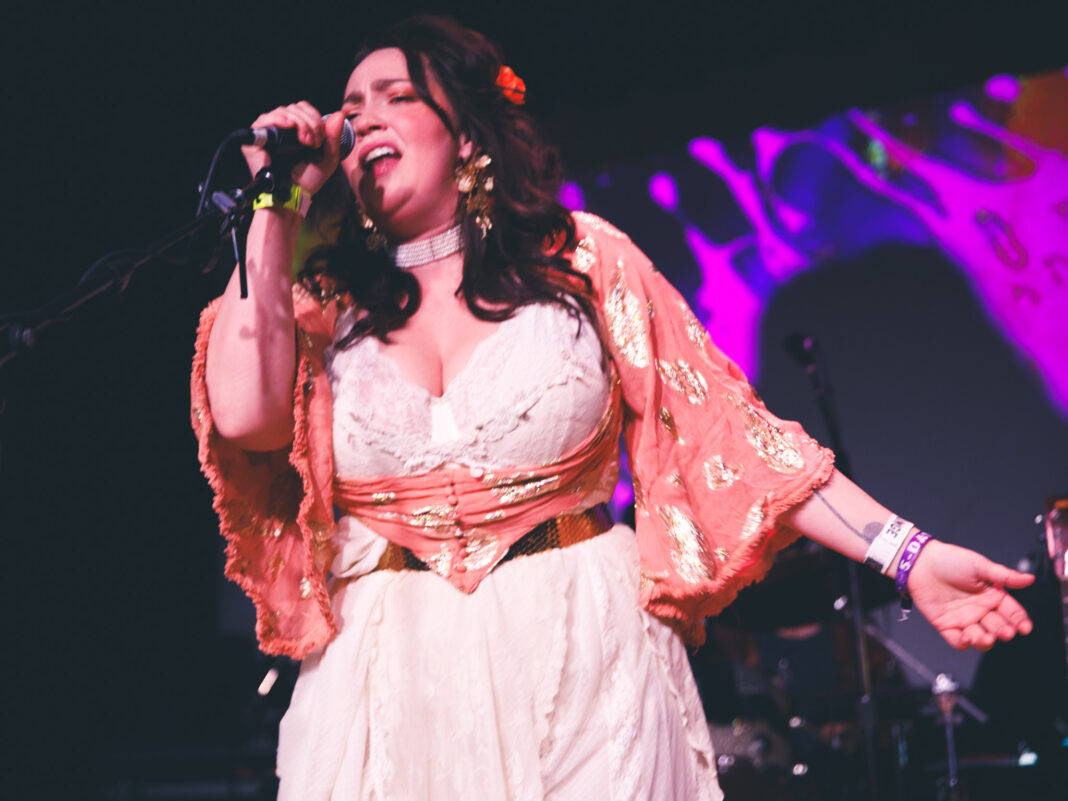I had no idea what to expect from Boise.
But when I got an invitation to attend the Treefort Music Fest, a five-day celebration of independent art and culture held in various venues throughout the downtown core of Boise, Idaho, I decided it was worth investigating. My knowledge of the city, which has a metro population of about 765,000 people, was limited to brief Instagram stories from artist friends who had performed there in years past. It’s hard to get much sense of anything in 15 seconds, so this felt like the travel equivalent of a blind date.
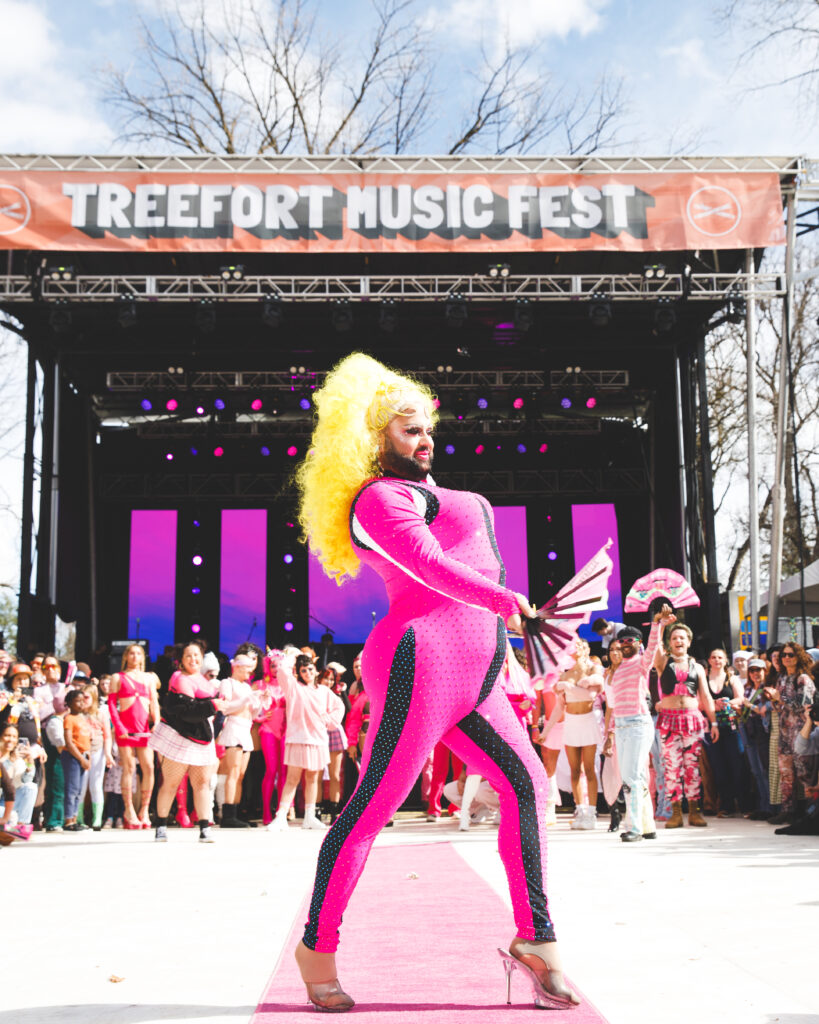
As a 40-year-old journalist and artist visiting Idaho, a state just south of my home province of British Columbia, for the first time, I attempted to take a temperature check on Boise’s mainstream and subcultural scenes—or at least what they felt like during festival time in late March (the dates for 2025 haven’t been announced yet). I’m happy to report that Boise’s locally focused art and music events felt surprisingly cosmopolitan. The festival has fostered an open-minded community where queer culture is built into mainstream culture, where straight people pack themselves into bars and brunch tents to see stylish drag queens strut their stuff.
My five-day exploration of Boise began with a crawl through the nooks and crannies of the city’s very cute, very touristy downtown core—much of which is covered in colourful murals by local artists like Ashley Dreyfus. However, before venturing out, I needed a quick trim from the bubbly and outgoing hairstylist Alyssa Henbest at Mullet Proof (Suite C, 928 W. Main St., Boise), whose conversation flowed as smoothly as her scissors. The website of the salon, which is queer owned and operated, puts their mission simply: “If you are tired of your hair being categorised or gendered, we are here to put an end to it!”
My visit also included daily stops at Guru Donuts (#100, 928 W. Main St., Boise) for gooey, vegan and gluten-free delicacies (“the unicorn of snacks,” says my partner, Reagan), made with an Idaho specialty: potato flour.
During the sunny days of the festival, I waded into big, playfully dressed crowds to watch headlining artists on the festival’s three outdoor stages in Julia Davis Park (700 S. Capitol Blvd., Boise), a large amenity-filled park on the banks of the Boise River, which divides the city in two.
At night, I got caught in the mosh pit during smaller artists’ sets in sweaty, intimate club venues. The best of these is Shrine Social Club (1118 W. Idaho St., Boise), a former Shriners’ club with two floors and a kitchen. I also enjoyed my time at The Shredder (430 S. 10th St., Boise), a DIY punk venue (with money) that offers “music, beer, pool, old school arcade games, and a half-pipe! What else can you ask for?” Good question.
Most evenings stretched into the wee hours at the Hap Hap Lounge (second floor, 722 W. Broad St., Boise). The indoor and outdoor rooftop patio bar, equipped with stairs and an elevator, is a perfect place to sip tasty non-alcoholic cocktails while making new friends, softly swaying to a masterfully curated dad rock DJ set from Jeffrey Silverstein.
The final night of the festival concluded on a magical note with a queer techno tribute to Fleetwood Mac (L.A.’s Fleetmac Wood, who seriously missed an opportunity to call themselves Meat Wood Flag). As I danced and sang along to Stevie Nicks’ “Wild Heart,” memories of the past five beautiful days in the city swirled together under disco ball lights, and I came to one simple conclusion: Boise is gay as hell!
That epiphany first occurred at the queer meet-up on night one of Treefort, held at the Spacebar Arcade (Suite 100, 620 W. Idaho St., Boise). In a room full of vintage gaming consoles with games like BurgerTime, and a claw game offering prizes like double-sided dildos, a gaggle of fabulously dressed people packed the bar to the rafters.
When the organizers of Dragfort arrived—the team dedicated to creating LGBTQ2S+-friendly spaces at Treefort—we were suddenly caught in the middle of a vogue ball, everyone making shapes in their most savage forms of realness. Dragfort’s stated mission is elevating and celebrating “the magic of expressing our most authentic selves.” They wove those spells at Spacebar, and they would do it time and time again throughout the festival.
The crucial context behind these observations is that events like Treefort, held in a liberal enclave like Boise (or Austin or Calgary), are a lifeline for queer and trans people in more conservative states like Idaho (or Texas or Alberta).
In March 2023, the Humans Rights Campaign (HRC) fired back against a vote in the Idaho House to pass Senate Bill 1100. While the bill’s stated purpose is “protecting the privacy and safety of students in public schools,” the HRC argues this is “legislation that prohibits transgender public school students from using bathrooms and locker rooms consistent with their gender identity.”
According to Cathryn Oakley, senior director for legal policy at HRC, “Idaho has a long track record of discriminating against transgender people. Yet again Idaho has passed a law singling out a vulnerable group of kids and harming them for no reason other than dislike, disapproval, and misunderstanding.”
So yeah, it sounds like the state of Idaho can be a scary, uncool place to be queer or trans. But the five days of Treefort showed that’s not the only story. What legislators do, and how society behaves, are two different things.
Drag brunch is an annual Sunday morning event at Treefort, and this year they served food for the first time. Club Squirt, held at Hap Hap Lounge, is a very apt name for a very wet dance party, with hot people wearing very little clothing. Julia Davis Park was full of folks from all walks of life— from families to drag queens, magicians to marijuana activists. One of the latter group turned himself into a walking, talking plant to embody the cause of legalizing cannabis.
I’m a straight-passing, white, bi guy with a female partner, so I don’t usually have to worry about being harassed on the street, but that’s certainly not true for everyone. During Treefort, I saw a gang of fashionable queens in wigs, heels, and miniskirts cross an intersection, smashing into another gang of old friends coming toward them. No one was afraid to squeal with delight, and that wonderful, candid moment told me everything that I needed to know.
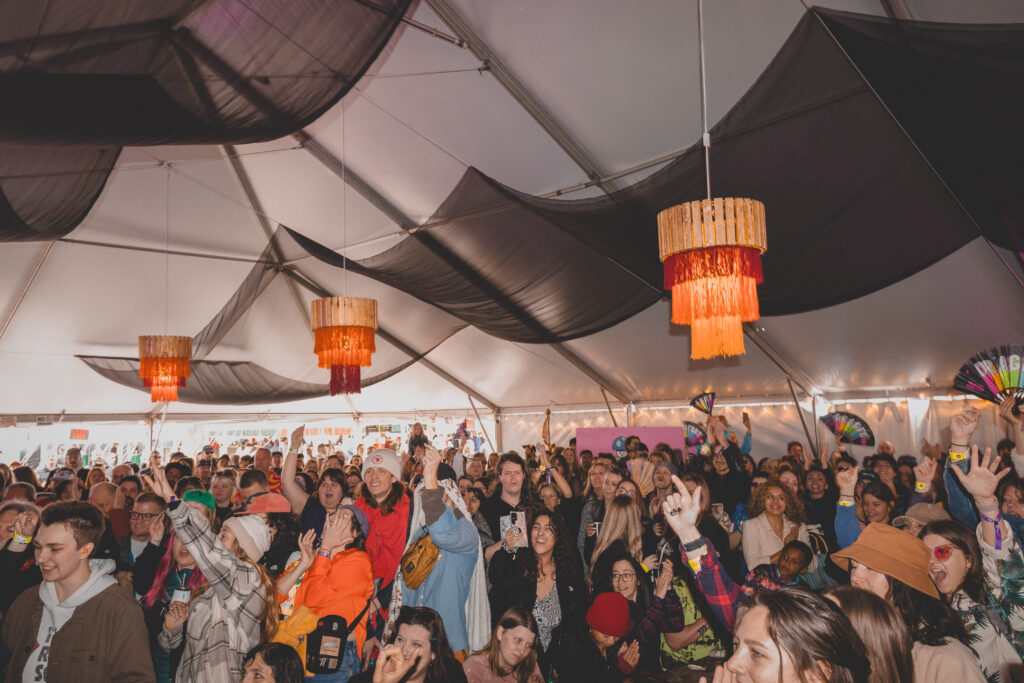
“As a queer person, I never know what the vibe is going to be when I’m travelling,” musician Mackenzie Ruth Scott told me during a brief interview following a performance from her moody indie rock band Torres on the side stage at Julia Davis Park. She’s based in New York but was born in Macon, Georgia.
“You can have an idea about a place and have it be totally wrong, in one way or the other,” said Scott, whose partner is the acclaimed painter Jenna Gribbon. “This is middle America, and I’m from the American South. What I can say is that I’ve felt nothing here in Boise but love and affection.”
Brendan Canty shares that sentiment. As the drummer of massively influential D.C. hardcore bands Rites of Spring and Fugazi, he’s been playing punk shows in Boise since 1993. These days, at age 58, Canty has taken on a new role: “dadager” and producer for his teenage daughter Mabel June Canty’s band, Birthday Girl. When he talked about seeing young bands on the stages of Treefort, his face lit up like a jack o’ lantern with a candle.
“I feel really at home in Boise,” said Canty. “Everybody tells me how much it’s growing, but the last time I was here for Treefort was 11 years ago. It’s honestly kind of the same.
“The festival seems way bigger than it was back then though, and I applaud what they’ve done for the city. It’s really clear that they go out of their way to welcome young, independent bands, which has created a scene, and turned Boise into a destination.”
And about the music….
After our laughter-filled conversation at Guru Donuts, Canty and I parted ways so he could prepare for his set that night with The Messthetics. This heavy-hitting band features bassist Joe Lally (also formerly of Fugazi) alongside jazz guitarist Anthony Pirog and their latest recruit, in-demand saxophonist James Brandon Lewis.
When the Messthetics hit the ballroom stage at the Shrine, they blew my head off. It’s one thing to hear their recordings; experiencing the quartet’s fusion of punk and jazz live is something else entirely. Pairing one of the world’s tightest post-hardcore rhythm sections with two transcendent improvisors is an astonishing thing to witness. Canty told me that they play together for fun three nights a week, and that camaraderie has created some powerful chemistry.
There were other musical highlights, of course. Inside the pitch-black stage of the Treefort Music Hall, Armand Hammer’s two nimble New York–based MCs traded off verses like a pair of old masters against a barrage of grimy, abstracted beats. Canadian alt-country darling Neko Case held a large outdoor crowd in the palm of her hand, as did local Boise indie rock heroes Built to Spill, charismatic German baritone Dadi Freyr and the great Chicago band Dehd—one of several artists using their platforms to call for a ceasefire in Gaza.
The Shredder clearly takes its name from the Teenage Mutant Ninja Turtles’ greatest rival. Like the fictional Shredder, they know the best way to attract crowds of all ages is by setting up pinball machines next to a stage. New Orleans’ queer electro-punk band Special Interest sent the Shredder crowd into a frenzy, alternating between raging techno and high menergy disco a lá Patrick Cowley.
Only one other live performance rose to Special Interest’s level of intensity, and that was the Austin, Texas teen girl punk band Die Spitz, who inspired an early morning mosh pit at the Rhodes Skate Park (1555 W. Front St., Boise). It was tons of fun watching local shredders—whizzing around on skateboards, roller skates or Razor scooters—as they threw down their best tricks on the massive vertical walls of the concrete bowl for a vocally appreciative crowd.
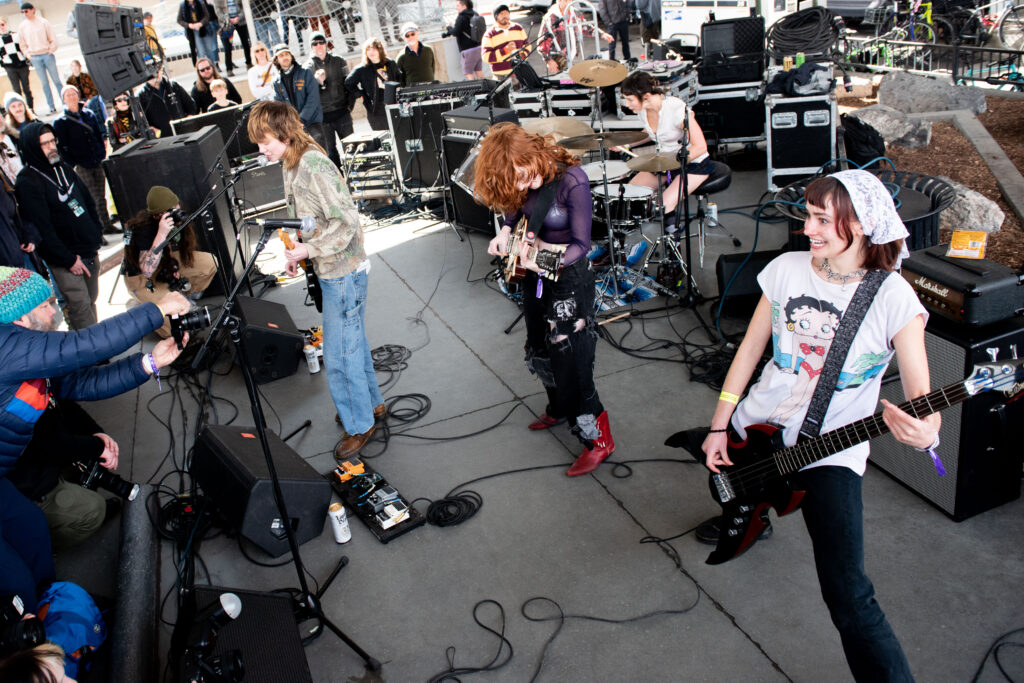
Cassandra Lewis is a rising star in the Nashville country scene, and I’m here to tell you that she’s the real deal. With a voice as big as Dolly and an octave range as wide as Mariah, she charmed the crowd at the Shrine into waltzing, then sold them vintage clothes at her merch booth instead of records. Keep an eye out for her, because she’s going places.
The Shrine ballroom, where I saw the Messthetics and Cassandra Lewis, also played host to the rowdiest mosh pit of the week when Hotline TNT took the stage. Equipped with three guitars, the overdriven, Jack White–approved shoegaze pop band, led by songwriter Will Anderson, are a force to be reckoned with.
There were three other musical artists that I’m still tripping about. Triple Rainbow are a kids’ band featuring two young sisters and their dad. During peppy performances of earworm insta-hits like “Bad Kitty,” “Dance Party” and “You Are Magic,” the neon-costumed, intergenerational trio pantomimed with fake cardboard instruments. The combination of joyful songs and interactive performances persuaded the morning crowd of parents and infants at the kidfort tent, all still waking up, to shake their wiggles out. As they sing, “let’s have a dance party … it’s always a good time.”
At night, Mexico’s Sonido Gallo Negro transformed the Shrine ballroom into another kind of psychedelic pachanga. Propelled by four percussionists and a lively theremin player among their 10-plus members, the band put highly unique spins on covers of Kraftwerk’s “The Model” and the B-52s’ “Planet Claire.” Dancing to those classic 1980s hits with that much energy behind them proved to be irresistible, so I went back and saw them do it again on the Bandshell stage at Julia Davis Park the next night.
Finally, the preppy, smiling musicians of fellow New Orleans band Video Age channelled classic power-pop with warbling synths and tasteful guitar solos, like the Cars by way of a miraculous major-key Elliott Smith. Video Age’s albums have been on regular rotation since I’ve returned home, and that’s what hearing new bands at a festival is all about.
A trans podcast and final thoughts
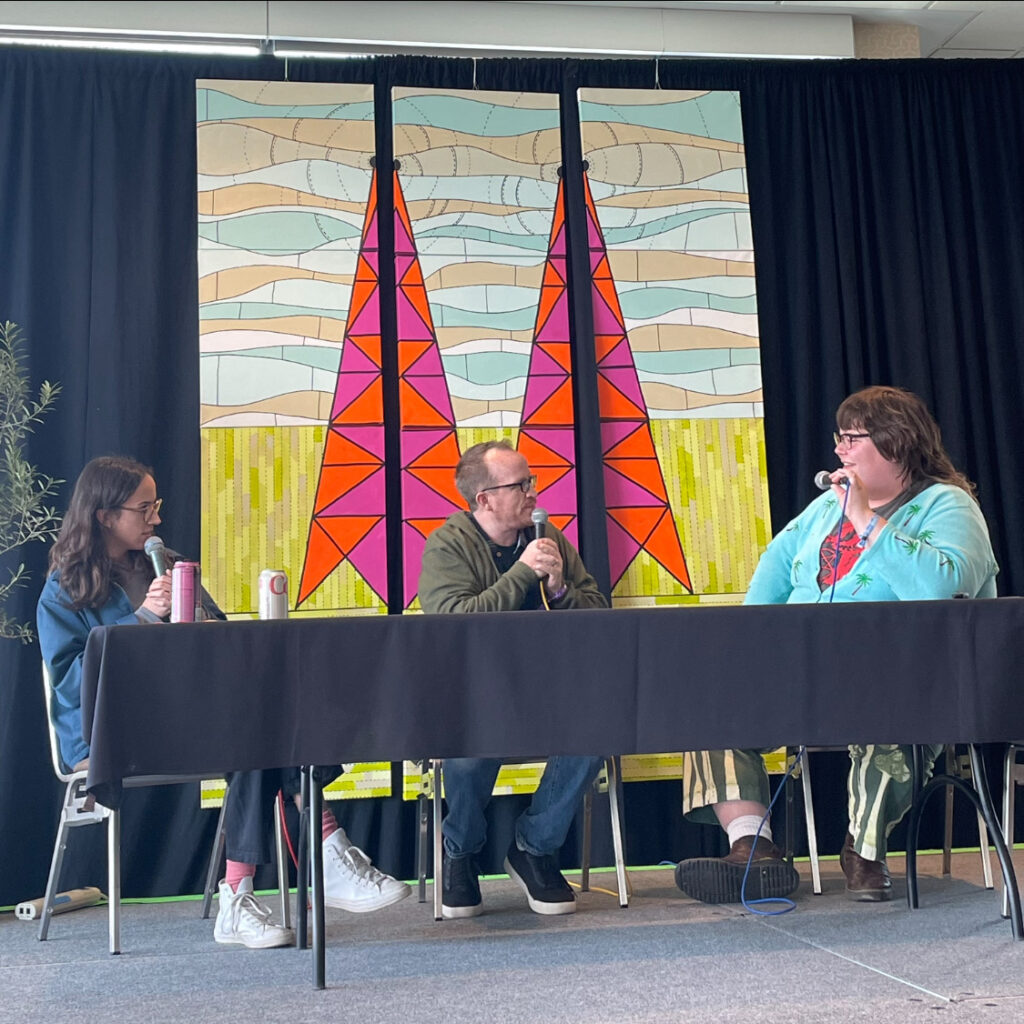
Alongside its accessible downtown-wide, multi-venue setup, the best thing about Treefort is that it has more than just music. My Friday morning at the festival started with the first-ever live taping of The Girl God Experience, the comedy podcast hosted by hilarious trans women comedians Grace Freud and April Clark. For this special occasion, the two hosts turned their interview mics toward fellow comedian Chris Gethard, a man known for welcoming open conversations about difficult topics on his call-in project, Beautiful/Anonymous.
Freud and Clark played dumb, pretending to be a pair of virgins who knew nothing about sex. Shuffling through stacks of cue cards, they pulled Gethard’s chain with questions about how many times they can healthily masturbate in one day, or what “Bear Party” videos are all about. It was awkward, hilarious and amazing, and I’m so glad I was there to laugh my head off in the front row, even though they occasionally roasted me.
“We’ve been to a lot of towns roughly this size, and Boise is just great,” Freud told me after the podcast taping. “Treefort is like what it would be like if SXSW didn’t suck. I don’t think Raytheon sponsors Treefort, but hopefully next year. Maybe they can work with the Navy or something smaller like the Coast Guard. Gotta start somewhere.”
Freud was joking, but she was sincere in what she said about Boise. Clark agreed with her. “I don’t mean this in an insulting way at all, but it feels like a small town that decided about 10 years ago to become a city.” The long-haired, bespectacled comedian laughed like a gleeful Gremlin in a hoodie. “That’s the bravest choice a small town can make.”
Gethard gave me the straightest answer (pun intended) when I asked for his thoughts on the city: “Once I got here, I instantly realized that Boise is cooler than I thought it was going to be,” he said. “It’s a hidden gem.”
My main takeaway is that Treefort was a very fun and welcoming festival experience, reminiscent of Sled Island in Calgary, which I’ve been told provided at least partial inspiration. Taking over the 10-block radius of a gentrified, mural-covered American city—fuelled by potatoes, independent art and enthusiasm—this is the place and time of year where people are free to safely express themselves in whatever way feels best.
Travelling to Boise provided an opportunity for me to visit a new place for the first time, and to make new friends from Edmonton, Toronto, Detroit, Seattle and the U.K. Among many other things, Treefort is a yearly gathering of like-minded souls.
I had no idea what to expect from Boise, but I would come back in a heartbeat. It’s clear from the smiling faces, singing voices and fabulously dressed folks that surrounded me that a lot of other people sure would, too.
Where to shop, eat and get a haircut
3peat Vintage (1025 W. Main St., Boise). This well-curated store sells vintage and collectible sneakers, T-shirts and other clothing, including a very affordable five-dollar pile.
The Record Exchange (1105 W. Idaho St., Boise). Idaho’s largest independent record store sells music, videos, gifts and espresso, and presents live musical performances on a small indoor stage.
Guru Donuts (#100 928 W. Main St., Boise). Guru offers delicious baked goods with vegan and gluten-free potato flour options—the unicorn of treats, and one unique to the state of Idaho.
Mullet Proof (Suite C, 928 W. Main St., Boise). Boise’s queer-owned and operated hair salon offers affordable prices, quick service and friendly conversation, alongside semi-regular bazaar sales for local artists.
Where to party
Boise Pride Festival (September 13 to 15, 2024). This big-hearted LGBTQ2S+ festival has been bringing the community together for 35 years.
Somewhere Bar (3544 W. Chinden Blvd., Garden City). Located in neighbouring Garden City, this is a friendly community-minded spot. They host drag performances, fetish events and karaoke.
Balcony Club (Suite 226, 150 N. 8th St, Boise). Maybe you’re not an indie music fan? This is a more trend-focused dance club that has a major gay following, and hosts lots of drag and queer events.
Hap Hap Lounge (Second floor, 722 W. Broad St., Boise). This upstairs patio bar offers indoor and (sparsely) heated outdoor seating options, with queer-friendly DJ nights and non-alcoholic drink options.
The Shredder (430 S. 10th St., Boise). This inclusive, all-ages punk venue offers music, beer, pool and old school arcade games.
The Shrine (1118 W. Idaho St., Boise). Boise’s former Shriners’ social club boasts a beautiful upstairs ballroom and a smaller downstairs music venue, plus a kitchen serving smash burgers and fries late into the night.
The writer’s trip to Boise was supported by the Treefort Music Fest and Riot Act Media. Treefort and Riot Act did not review or approve the story before publication. The views expressed are the writer’s own.
